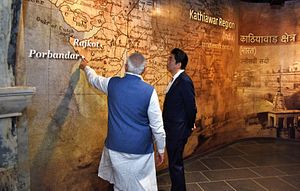For ten days last month, the navies of Japan, India, and the United States engaged in the annual Malabar naval exercises, this time off the coast of Guam. In the past, Japan’s participation in these exercises—especially when they are hosted by India—has been intermittent, largely due to opposition from Beijing. In 2015, however, the United States and India announced that Japan would rejoin Malabar as a permanent member.
It was also around this time that a growing chorus of analysts began either predicting or advocating a Japan-India alliance based on the incredible rate at which Japan and India have deepened their strategic partnership since the turn of the century. Predating them slightly was Japanese leader Taro Aso, who as deputy prime minister in 2013 had said, “I see India and Japan as an alliance, linked by their philosophy and moved by their values.” While Aso’s statement may have been aspirational, leaders on both sides have taken the sentiment seriously, as has China. When Japanese prime minister Shinzo Abe visited New Delhi in September 2017, the Chinese foreign ministry warned that “regional countries should stand for dialogue without confrontation and work for partnership instead of alliance.”
Although journalists and policy wonks may use the term alliance loosely, it has a specific meaning for diplomats and statesmen. All the more so for a country like Japan that has been in an alliance with the United States for decades. An alliance is a formal agreement between two or more states for the use (or non-use) of force in specified circumstances against one or more other states. Given that Japanese leaders themselves are using the term, it bears examining whether Japan and India might actually come to such an agreement with regard to their most obvious shared threat, China.
In a recent article in International Affairs, I argue there are three reasons why a Japan-India alliance is unlikely to materialize.
First, despite the best efforts of the BJP government led by Narendra Modi, New Delhi remains deeply conflicted between its traditional commitment to nonalignment—now labelled strategic autonomy—and newer impulses to become a “leading power” in international affairs. Strategic autonomy dictates a position of standing firm against China without getting too close to its potential adversaries, i.e. the United States and Japan. The uncertainty generated by this policy can even act as a source of leverage for India in its interactions with China. But as far as a Japan-India alliance is concerned, strategic autonomy means that while India is content to throw its diplomatic weight behind Japan, New Delhi will be unwilling to commit its forces to the defense of Japan.
Second, alliances carry with them the risk and fear of getting entangled in an alliance partner’s conflicts. A formal arrangement whereby India and Japan are committed to use force in aid of each other’s defense would risk Japan getting drawn into a potential conflict between India and Pakistan—a higher-probability event than an India-China military conflict. Conversely, India would risk getting drawn into a potential conflict between Japan and North Korea. Not only would these entanglements create political problems at home, they would also be virtually impossible to sustain militarily. Despite their respective strength and sophistication, the Indian Navy and Japan Maritime Self-Defense Force are nowhere close to being able to sustain military operations thousands of miles away from their home bases.
Finally, even if a Japan-India alliance were designed to operate only with regard to China, it would suffer from a major commitment problem at its core. Alliances are prone to buck-passing when geography and the state of military technology render the cost of defense lower than the cost of attack. In other words, if either country perceives its alliance partner as being able to successfully defend or stalemate a Chinese attack, it will have less incentive to get involved when a Chinese attack actually materializes. Arguably the South Asian and East Asian theaters currently favor the defense, thus increasing the likelihood that both parties will find reasons not to honor their alliance commitments when the time comes.
An even more intractable commitment problem originates in China’s own policy toward a putative Japan-India alliance. With a nuclear arsenal, military, and economy far superior to both countries, China is unlikely to passively witness the formation of a Japan-India alliance. New Delhi and Tokyo know this, and are therefore rightly wary of going beyond the rhetoric of alliance to actually taking any steps toward formalizing a mutual defense pact. Concerns about a Chinese backlash remain a powerful limiting factor on Japan-India relations.
Given the above realities, it is hardly surprising that having experienced a near-confrontation with China last year at Doklam, Prime Minister Narendra Modi revived the notion of India’s strategic autonomy during his speech at the Shangri-la Dialogue in Singapore last month. Moreover, this month’s Malabar exercise was marked by India’s refusal of Australia’s request to participate, a refusal that amounted to India distancing itself from the much-hyped Quad that Japan has strenuously championed.
Although the prospects may be dim for a Japan-India alliance, the good news for both countries is that their strategic partnership is thriving. So long as Japan continues to invest in India’s hard-power potential and India continues to coordinate strategy with Japan, both countries will find themselves stronger in the event of a future diplomatic or military crisis. Japan and India are better off aligned—as they currently are—than allied.
Rohan Mukherjee is an assistant professor of political science at Yale-NUS College, Singapore.
































